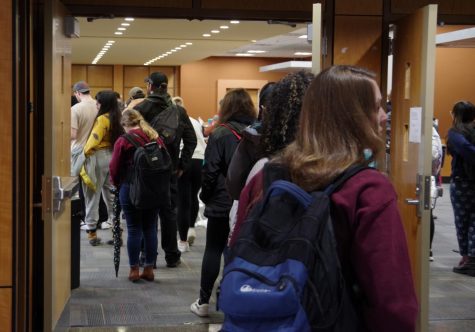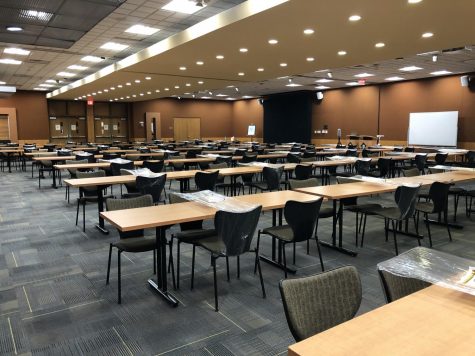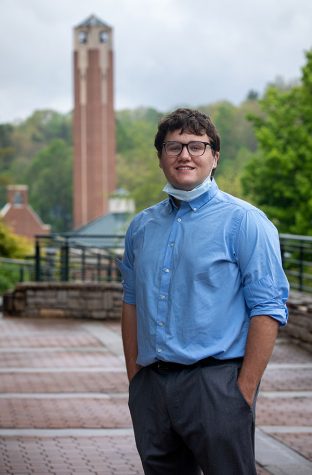State Board of Elections votes to keep early voting site in union despite opposition from App State administration
The North Carolina State Board of Elections voted 3-2 party line vote to keep the Blue Ridge Ballroom as the on-campus one-stop early voting site this election year.
The state board had to decide between the Holmes Convocation Center concourse or the Blue Ridge Ballroom in the Plemmons Student Union after the Watauga County Board of Elections could not come to a unanimous decision.
“Nothing that happens in our society can happen unless we get voting right,” said Damon Circosta, chair of the state board. “I am hopeful that the board of elections in Watauga County and ASU can continue this great working relationship.”
Originally, App State administration said the only available space for a voting site was the Holmes Convocation Center because there are nine classes taking place in the ballroom.
Watauga County BOE members disagreed and argued the site should remain the same because it’s one of the most heavily trafficked voting sites in Watauga County and the university could move around classes for those two-and-a-half weeks.
In 2016, nearly 6,500 people voted in the Blue Ridge Ballroom while over 4,700 people voted there in the 2018 general election.
Eric Eller, Watauga County BOE member, represented the Holmes Convocation Center plan and argued that it would be a better site because it would be easier to maintain social distancing guidelines.
Eller said that the longest line at one point during voting at the Blue Ridge Ballroom was 170 people long, which, accounting for 6 feet of social distancing, would stretch over 700 feet through the union.
“That wouldn’t even make one lap around the concourse at the convocation center,” Eller told the state board. “It’s not even a close call.”

Jane Hodges, chair of the Watauga County BOE, represented the Blue Ridge Ballroom plan to the state board. She mentioned that during the BOE vote, the county board received a petition with over 1,000 signatures in support of the Blue Ridge Ballroom.
Senior economics major and App State College Democrats president Dalton George created the petition.
“I’m really appreciative that the petition we made could have the impact it did. The state board was on the right side, they protected student voting rights,” George said. “I just wish I could be proud of my university and say they did the same.”
App State College Republicans president River Collins is glad the state board decided to keep the voting site on campus.
“A voting site on campus makes it easier for students to ultimately, influence democracy and the future of this county,” Collins said. “To say I am thrilled does not do it enough. It is a great victory for democracy and for students.”
Matthew Dockham, director of external affairs for App State, was one of the representatives from university at the meeting.
He said the administration would advocate for the Holmes Center because the Blue Ridge Ballroom will still hold classes during the early voting period.
“The chancellor did make the decision to use every nook and cranny that we have available on campus to make sure that we maintain safety and health for our faculty, students and staff, and part of that was utilizing states in the space of the student union,” Dockham said.
Dockham said there were issues of internet connectivity and that the chancellor didn’t want to disrupt students’ semesters any more, which is why the administration wouldn’t want to move the classes to the convocation center.
App State has not responded to a request for comment at this time.

Stella Anderson, App State professor and state board member, argued that of the classes held in the Blue Ridge Ballroom, six of them could be moved to a different spot in the union at the same time while the other two could be moved to the solarium.
“It is my view that it’s not asking too much to make temporary arrangements if there are still classes meeting face-to-face at that time,” Anderson said.
Anderson said the Blue Ridge Ballroom is the best choice for the on campus voting site.
“We, as the state board, can demand the use of a building for early voting in this election,” Anderson said.
Early voting will begin Oct. 15.
“We, the state board, the county boards recognize that with COVID, the university is rightfully concerned about university operations,” Anderson said. “But we, however, are required to be concerned with the suitability of a site for voting purposes.”
We hope you appreciate this article! Before you move on, our student staff wanted to ask if you would consider supporting The Appalachian's award-winning journalism.
We receive funding from the university, which helps us to compensate our students for the work they do for The Appalachian. However, the bulk of our operational expenses — from printing and website hosting to training and entering our work into competitions — is dependent upon advertising revenue and donations. We cannot exist without the financial and educational support of our fellow departments on campus, our local and regional businesses, and donations of money and time from alumni, parents, subscribers and friends.
Our journalism is produced to serve the public interest, both on campus and within the community. From anywhere in the world, readers can access our paywall-free journalism, through our website, through our email newsletter, and through our social media channels. Our supporters help to keep us editorially independent, user-friendly, and accessible to everyone.
If you can, please consider supporting us with a financial gift from $10. We appreciate your consideration and support of student journalism at Appalachian State University. If you prefer to make a tax-deductible donation, or if you would prefer to make a recurring monthly gift, please give to The Appalachian Student News Fund through the university here: https://www.givecampus.com/campaigns/54088/donations/new?designation_id=faa93386&

Moss Brennan (he/him) is a senior journalism major with a minor in political science and media studies. He has worked on The Appalachian since freshman...
